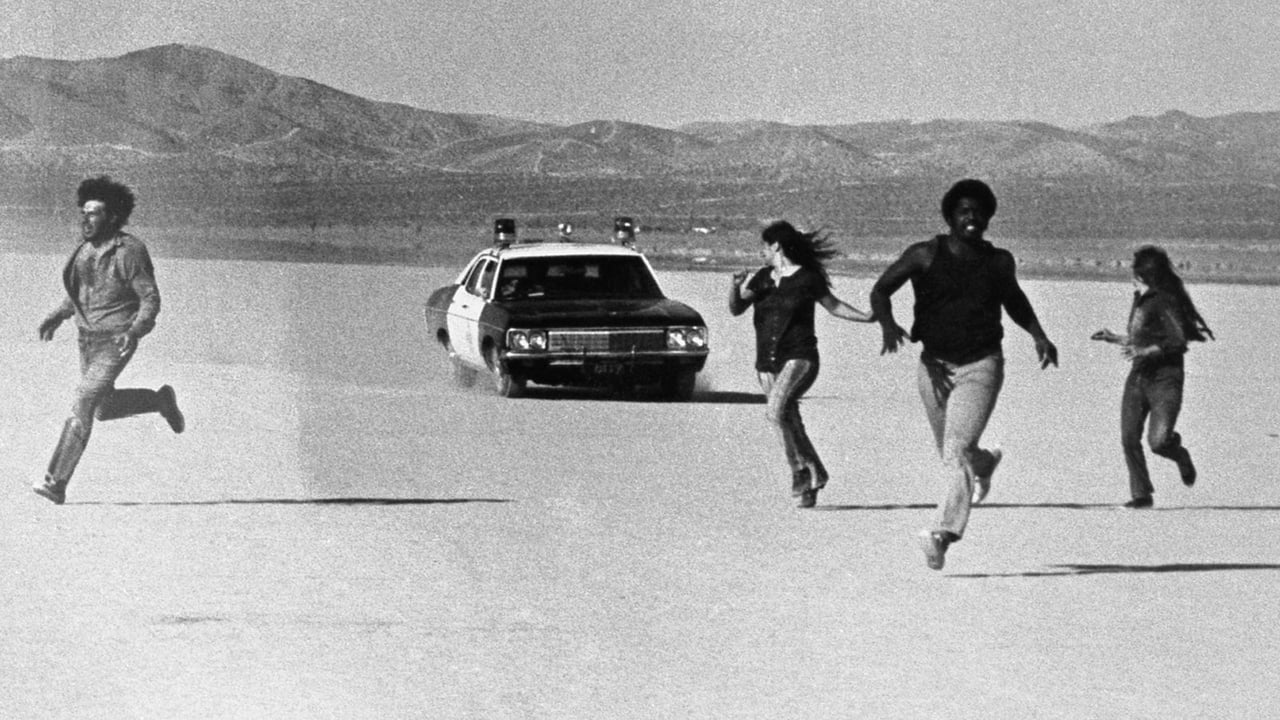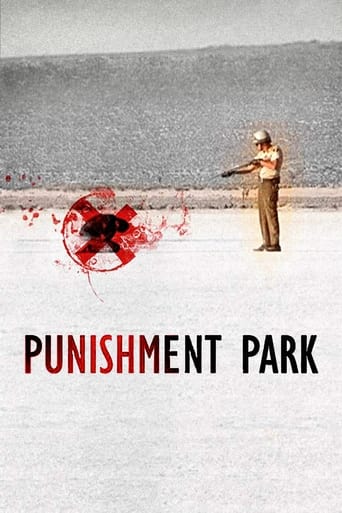

Strictly average movie
... View MoreBoring, long, and too preachy.
... View MoreI really wanted to like this movie. I feel terribly cynical trashing it, and that's why I'm giving it a middling 5. Actually, I'm giving it a 5 because there were some superb performances.
... View MoreIt is interesting even when nothing much happens, which is for most of its 3-hour running time. Read full review
... View MorePeter Watkins' film Punishment Park is nothing if not a sincere cry for justice. Of course the film is a metaphor, a provocation, a sort of alternate reality that could have been a science fiction fable if it wasn't so naturalistic as a "fake" documentary. And of course there weren't 'Punishment Parks' in America in 1970 when the film was made, where dissidents and rabble-rousers and draft dodgers were taken and given the chance to either participate in the 'game' or go to prison without a fair trial. And sure, at the time, the film got panned for being too blunt an instrument of provocation, of being so much about its subjects of the US versus THEM element that it was too much.But what can be said of the film today? At the time for those who didn't know it was a "fake" documentary, like in Finland, they panned the US government for allowing such a thing like this to happen! This is, perhaps, the best kind of compliment Peter Watkins could have received - certainly he fared better there than with the film critics who panned it and, ultimately, the film got four days of distribution by a no-nothing company before being pulled from NY city screens (it fared worse in being shown on TV or elsewhere, where for years it was just unavailable). Seeing it in 2010 is still a shocker some forty years later. Not because of what it says about its time and place, that's a given, about the rift between those in power and those not, but that it could still happen, in a slightly less extreme form, today (just look at the atrocity of justice with Guantanamo Bay for that).There's something about this film that gets under my skin. It got its way in within the first ten minutes, by sinking its teeth with its structure, of it being a British documentary on this 'Punishment Park' out in the California baron wasteland (it could be Death Valley, but whatever it is it's unbearable conditions), and how nothing is made to look fantastic. The nerve of the film is like that of Night of the Living Dead in its no-holds-barred hand-held approach to photography (only in this case the police seem to be the zombies, albeit with more of a brain which is perhaps much more frightening). Watkins cuts between this demonstration of what the 'Park' is - a three to four day excursion from one point to another where those who volunteer (and there are many, as the alternative is years in prison) who have to get to an American flag. Which is not easy when you have police just getting ready and more than willing to kick the crap out of those dissidents and, of course, shoot to kill.This is all meant as metaphor, and the most contemporary example I could think of as comparison would be District 9 (though that film didn't carry out its artistic premise anywhere near as thoroughly as this). But the metaphor is strong because of a) what was happening at the time, with Chicago and Kent State and the trial of the Chicago 7 (Bobby Seale's gagging during the trial is recreated here with one such African American on "trial"), and of the attitudes at the time. The what if shouldn't be diminished because of thinking practically about what would happen if this really did occur. What matters is making it seem real, carrying the documentary aesthetic and toying with it - Watkins goes from objective reporter to subjective "WTF"-ing at the police killing and maiming people from one scene to the next, which is chillingly effective - to make the experience last in the mind.Aside from it being a rigorous example of film-making, and a satire that is about as funny as a burning school-bus on a field trip, Punishment Park gets some major points. And the fact that many in the film never acted before or wouldn't again (some of which were actual dissidents and protesters as the kids, and some of the cops were actual cops) heightens the tension and moral identity of the scenes. But really its ultimate impact is that it lasts, in the mind as well as the consciousness of a nation. The US has laws in place to keep this from happening, to be sure, but at what point does the line thin away? Most recently there's been question of how to put on trial those accused of terrorism against the US. That, too, is an extreme example, but, again, where is that line drawn? A question I was left with at the end, or thought people might have by the end of it, is "What will be done about it?" Or, more precisely, "What can be done?" It's a call to arms that shook me up and made me depressed, but I can't say it didn't do it in the way that matters. It's one of the great incendiary films in our history; that it's also an experimental piece in the realm of documentary-meets-fiction, breaking all boundaries for its message, is further extraordinary.
... View MoreCommitted doom and gloomer Peter Watkins goes slummin' across the pond to take on the American justice system circa 1971 with this priceless piece of zeitgeist paranoia that leans so far left it falls over constantly. Watkins is pure tourist as he assembles this our gang tragedy with cliché freaks, hippies and black revolutionaries pitted against trigger happy cops and military and a kangaroo court tribunal made up of disapproving calcified adults making poor fashion statements. Talk about a revolution.In Punishment Park we have radical youth versus corrupt system as dissenters convicted of crimes are given the choice of imprisonment or a three day trek across Punishment Park (Death Valley) and freedom. Of course the law enforcement officials monitoring their journey aren't about to play fair and combined with the stifling heat the fate of our protagonists looks sealed.Punishment Park has elements of Kafka in setting as well as theme. Trials are held under a large canvas tent where shackled prisoners shout defiance at a hardcore love it or leave it group of inquisitors (such as members of Silent Majority for a Peaceful America) who snarl back. Neither group spends much time listening to the other and the proceedings sometime takes on a teen parent battle over the keys to the car look. Mostly its just one side saying what's wrong with America the other saying what's right with no one offering solutions for change. Meanwhile the Punishment Park martyrs stumble endlessly about the dessert while cops with guns act like twelve year olds. It kind of has the look and feel of some of my 70's college film making class when we were younger and knew more then than we do now.Peter Watkins has always been on the side of the underdog and the common man against what he perceives as a corrupt powerful few. Culledon was a strong indictment of military atrocity in 18th century Scotland that still resonates. War Game is a raw sobering look at nuclear aftermath that should be required viewing for all. Punishment Park has its value as well but for other than intended reason. Watkins vision today is a textbook example of the left in full tilt counter culture 70s paranoia and given the times ( Vietnam, Kent State, The Chicago 7) such strident hysteria seemed not that great a distance from the truth. But 35 years later the fever has subsided and Punishment Park with it's unrestrained narrow viewpoint is a pretty silly ride.
... View MoreI stumbled across this in progress on Sundance. I'd never heard of it, and I have to say I had a hard time deciding whether it was real or not, except for the unrealistic plot of giving people a choice to walk this death-course in lieu of prison, and the unlikely events at the end. I kept asking myself, "why don't these people just walk at night in the cool, and sleep in the afternoon under some rocks or cave ?" I missed the beginning, so I'm guessing they didn't have that choice. The acting was incredible though, especially of the tribunal and the dissidents being interviewed. I can see how this would've been quite explosive in 1971 at such a fragile time in U.S. history after Kent State; I can understand why it was banned at the time. This movie would've given birth to even more riots and deaths, especially back then with the lack of electronic media vs. today, and the public not having been exposed to many fake documentaries. Wow, this movie was intriguing - the most life-like fake documentary I've ever seen !
... View MoreI saw Peter Watkin's Culloden and The War Game a few months before this and was very impressed. The technique is essentially the same, or at least very similar, in this film detailing on the one hand a trial of dissidents in California in the (apparently) near future, and on the other the attempts of a group of convicted "criminals" to slog through 50 miles of desert to win their freedom in a government-run "punishment park" as an alternative to prison. Watkins films everything in a documentary style, which causes for more than a little awkwardness or required strong suspension of disbelief: how is it that the camera crew is with the group of starving and parched prisoners over 2 days without either offering help or sharing in their misery? And that's merely the most obvious example. But questionable storytelling aside, this packs a punch; no question you have to be interested in political film-making to really get involved, but the film really isn't like anything else of its era: it pulls no punches, offers no simple solutions. The leftist political figures are certainly painted broadly at times, but they aren't all alike; the right-wing government functionaries seem a little more cartoonish, but even they are allowed to show at least a little humanity. Overall, the film gives much to think about and leaves an indelible taste.....8/10 DVD rental
... View More